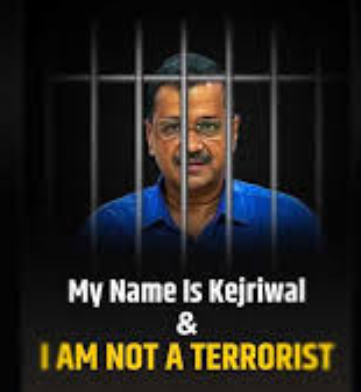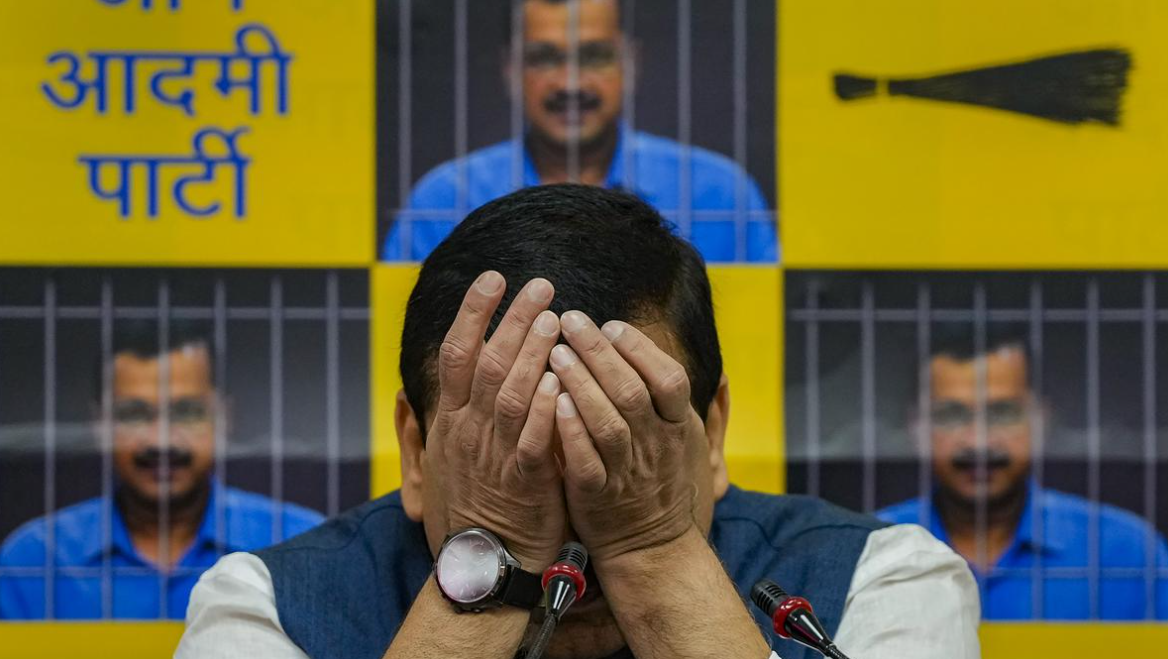Kejriwal’s Message from Jail
The incarceration of political figures often sparks controversy and speculation. In the case of Arvind Kejriwal, the Chief Minister of Delhi, his recent message from jail seeks to refute allegations of terrorism leveled against him. This paper aims to delve into the context surrounding Kejriwal’s imprisonment, the accusations made against him, and his response from confinement. By analyzing the political dynamics, legal intricacies, and public perceptions surrounding this case, this paper seeks to shed light on the broader issues of political dissent, freedom of expression, and judicial integrity.
Table of Contents:
- Introduction
- Context: Arvind Kejriwal’s Incarceration
- Allegations of Terrorism: Fact or Fiction?
- Kejriwal’s Message from Jail: A Rebuttal
- Political Implications and Public Perception
- Legal Ramifications and Judicial Scrutiny
- Conclusion: Upholding Democratic Values in Challenging Times
Introduction: The imprisonment of political leaders often serves as a lightning rod for controversy and debate, particularly when allegations of serious crimes are involved. In the case of Arvind Kejriwal, the Chief Minister of Delhi, his recent confinement has been met with allegations of terrorism, casting a shadow over his political career and public image. Kejriwal’s message from jail, asserting his innocence and refuting the accusations against him, has sparked a renewed discussion about the intersection of politics, law, and public perception in contemporary India.  ‘My name is Arvind Kejriwal, and I am not a terrorist
‘My name is Arvind Kejriwal, and I am not a terrorist
Context: Arvind Kejriwal’s Incarceration: Arvind Kejriwal, a prominent figure in Indian politics, has been a vocal critic of corruption and injustice within the political establishment. As the Chief Minister of Delhi, he has implemented several reforms aimed at improving governance and accountability in the national capital region. However, his tenure has also been marked by controversy and conflict with rival political parties, particularly the Bharatiya Janata Party (BJP), which has accused him of various wrongdoings.
Allegations of Terrorism: Fact or Fiction?: The most recent controversy surrounding Arvind Kejriwal revolves around allegations of terrorism. Kejriwal has been accused by political opponents of supporting and inciting violence during recent protests in Delhi, particularly the farmers’ agitation against contentious agricultural reforms. These allegations have been vehemently denied by Kejriwal and his supporters, who argue that they are politically motivated and lack credible evidence.
Kejriwal’s Message from Jail: A Rebuttal: In his message from jail, Arvind Kejriwal has sought to address the allegations against him directly. He has reiterated his commitment to non-violent protest and democratic principles, emphasizing that his imprisonment is a result of his refusal to compromise on his principles. Kejriwal has called upon his supporters to remain steadfast in their commitment to justice and to continue the fight against corruption and injustice.
Political Implications and Public Perception: The accusations against Arvind Kejriwal and his subsequent imprisonment have significant political implications. They have further polarized an already divided political landscape, with supporters and detractors of Kejriwal taking entrenched positions. Moreover, they have raised questions about the fairness and impartiality of India’s judicial system, particularly in cases involving high-profile politicians.
Legal Ramifications and Judicial Scrutiny: The legal ramifications of Arvind Kejriwal’s imprisonment are complex and multifaceted. While he has been charged with serious offenses, including sedition and terrorism, questions have been raised about the legitimacy of these charges and the evidence supporting them. Moreover, the manner in which Kejriwal’s case is handled by the judiciary will have far-reaching implications for the future of democracy and the rule of law in India. ALSO READ: Navigating the Challenges of Malnutrition: Assessing Progress and Paths Forward
Conclusion: Upholding Democratic Values in Challenging Times: In conclusion, the case of Arvind Kejriwal’s imprisonment raises fundamental questions about the intersection of politics, law, and justice in contemporary India. Regardless of one’s personal opinions about Kejriwal and his political agenda, it is imperative that the principles of due process, fairness, and accountability are upheld in his case. Moreover, it is essential to recognize the broader implications of his imprisonment for democracy and the rule of law in India, and to work towards ensuring that these values are safeguarded in the face of political turmoil and controversy.






win 1 1win6001.ru .
1vin казино http://www.1win6001.ru .
1wiun 1wiun .
поддержка мостбет https://mostbet6006.ru .
1 вин официальный http://familyclub.borda.ru/?1-6-0-00002163-000-0-0-1743051813 .
1вин войти http://1win6001.ru/ .
1win com familyclub.borda.ru/?1-6-0-00002163-000-0-0-1743051813 .
1win зайти http://familyclub.borda.ru/?1-6-0-00002163-000-0-0-1743051813 .
1win. pro https://1win6049.ru .
1 вин. 1 вин. .
1win сайт вход http://alfatraders.borda.ru/?1-0-0-00004932-000-0-0-1743258210 .
1wi http://www.balashiha.myqip.ru/?1-12-0-00000437-000-0-0-1743258848 .
1win на телефон 1win6049.ru .
1win мобильная версия сайта http://1win6049.ru/ .
1 win казино https://1win6049.ru/ .
один вин официальный сайт http://www.balashiha.myqip.ru/?1-12-0-00000437-000-0-0-1743258848 .
1win.kg 1win.kg .
1-win http://balashiha.myqip.ru/?1-12-0-00000437-000-0-0-1743258848/ .
1 вин https://obovsem.myqip.ru/?1-9-0-00000059-000-0-0-1743051936 .
1win rossvya http://www.1win6050.ru .
1win личный кабинет 1win6050.ru .
mostbet casino http://svstrazh.forum24.ru/?1-18-0-00000136-000-0-0-1743260517 .
1 вин вход https://obovsem.myqip.ru/?1-9-0-00000059-000-0-0-1743051936/ .
1win rossvya http://obovsem.myqip.ru/?1-9-0-00000059-000-0-0-1743051936/ .
mostbet chrono https://www.svstrazh.forum24.ru/?1-18-0-00000136-000-0-0-1743260517 .
1win online https://www.obovsem.myqip.ru/?1-9-0-00000059-000-0-0-1743051936 .
1вин сайт официальный http://1win6050.ru .
mostbet https://svstrazh.forum24.ru/?1-18-0-00000136-000-0-0-1743260517 .
1win.kg 1win.kg .
1win кыргызстан https://1win6051.ru .
1 вин вход в личный кабинет https://1win6051.ru .
1win скачать kg https://www.1win6052.ru .
1хwin https://1win6052.ru .
1win ставки официальный сайт https://1win6051.ru/ .
1win онлайн 1win онлайн .
1win регистрация https://1win6053.ru .
мостбет промокод мостбет промокод .
1 vin 1 vin .
1win вход на сайт http://www.1win6053.ru .
1win https://1win6053.ru .
1win.com.ci 1win5011.ru .
1 win moldova 1 win moldova .
descărca 1win descărca 1win .
1вин вход 1win6009.ru .
1win ru https://1win6009.ru .
mostbet kg скачать mostbet6012.ru .
mostbet apk скачать https://mostbet6012.ru/ .
1вин войти http://1win6009.ru/ .
мостбет зеркало мостбет зеркало .
мостбет chrono https://mostbet6012.ru/ .
1вин официальный мобильная http://www.1win6046.ru .
ипотека под материнский капитал crediteurasia.ru .
ипотека под мат капитал http://www.crediteurasia.ru .
Thanks for the article. Here’s more on the topic https://cultureinthecity.ru/
музыка скачать бесплатно в хорошем качестве без регистрации на телефон музыка скачать бесплатно в хорошем качестве без регистрации на телефон .
Thanks for the article. Here’s more on the topic https://tonersklad.ru/
Thanks for the article. Here’s more on the topic https://up-top.ru/
Thanks for the article. Here is a website on the topic – https://kanunnikovao.ru/
Thanks for the article. Here’s more on the topic https://my-caffe.ru/
Here’s more on the topic https://voenoboz.ru/
пластиковые окна москва пластиковые окна москва .
Thanks for the article https://ipodtouch3g.ru/
ushp-fundament-pod-klyuch-499.ru .
ушп под ключ цена .
Thanks for the article http://users.atw.hu/nlw/viewtopic.php?p=56733#56733 .
Thanks for the article https://seoprobox.click/increase-backlinks-ahrefs-domain-rating-50-60-70-moz-domain-authority-20-30-and-guest-posting-31546/ .
Website https://amurplanet.ru/ .
Website https://remonttermexov.ru/ .
Веб сайт https://urkarl.ru/
Веб сайт https://urkarl.ru/
Website – https://lostfiilmtv.ru/
Website – https://lostfiilmtv.ru/
промокоды сегодня
Para entender mejor tus síntomas urológicos visita la Clínica de Urología Moderna, donde todo está explicado por especialistas.
La Clínica de Urología Moderna ofrece en un solo recurso explicaciones sobre diagnósticos, tratamientos y recuperación.
Para saber cómo se tratan los problemas urinarios hoy en día, consulta la Clínica de Urología Moderna.
La Clínica de Urología Moderna ofrece un recurso online donde cada servicio está descrito con lenguaje sencillo.